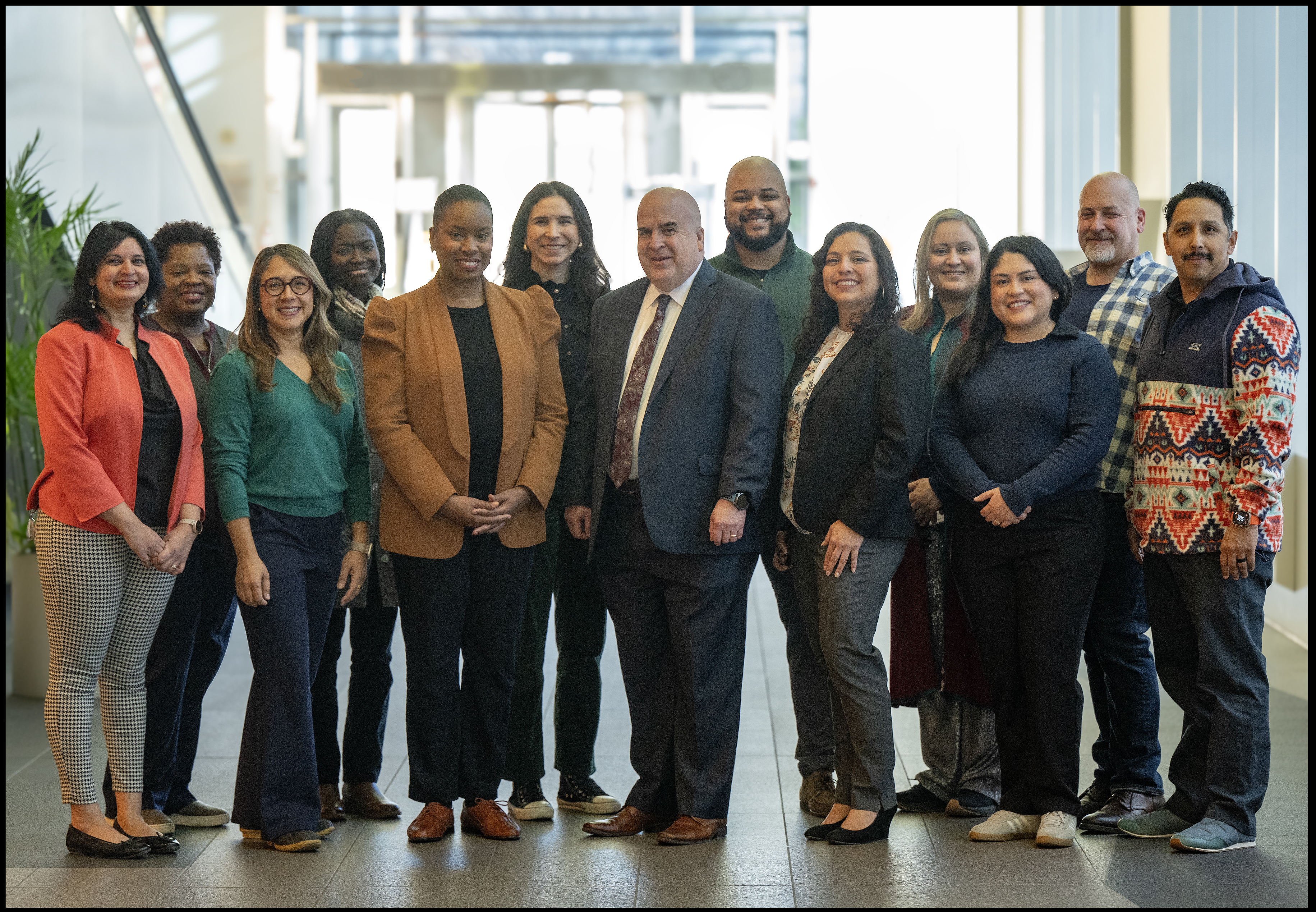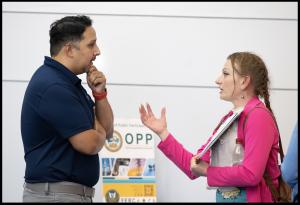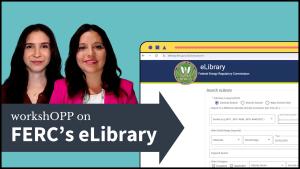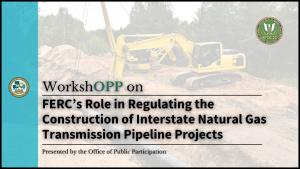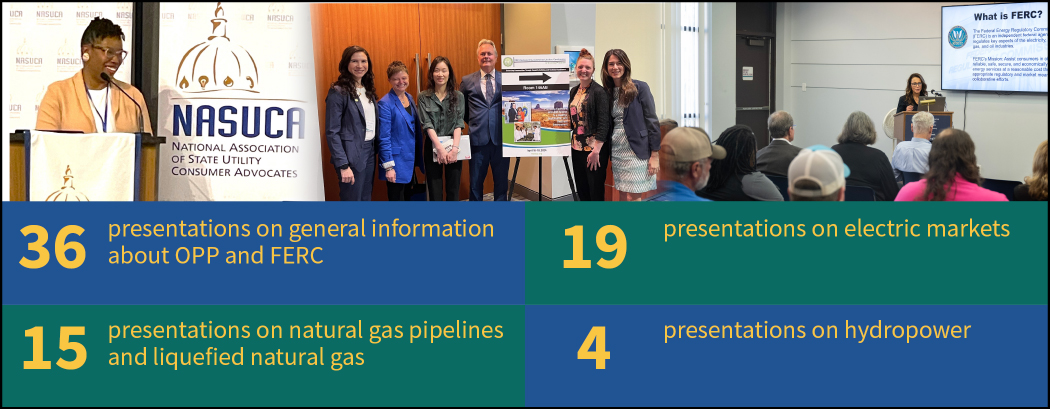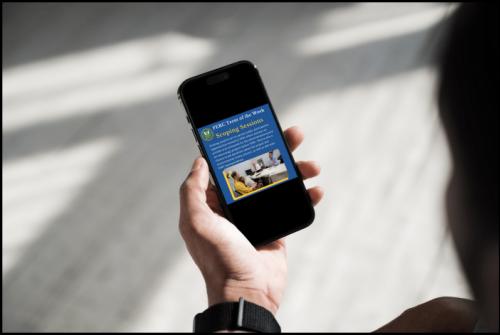| 2024 Annual Report: Message from the Director |
|---|
|
|
| Why Public Participation Matters at FERC |
|---|
|
|
About FERC
The Federal Energy Regulatory Commission (FERC) is an independent, quasi-judicial agency that regulates key aspects of the electricity, natural gas, and oil industries. FERC’s mission is to assist consumers in obtaining economically efficient, safe, reliable, and secure energy services at a reasonable cost through appropriate regulatory and market means and collaborative efforts.
Mission of FERC’s Office of Public Participation
Established by Section 319 of the Federal Power Act, the mission of the Office of Public Participation (OPP) is to empower, promote, and support public voices in FERC proceedings. OPP assists members of the public who are interested in participating in FERC proceedings, who may have questions about FERC proceedings, or who want to learn more about FERC and its role as a federal regulatory agency in the energy sector. OPP supports members of the public in their efforts to:
- Learn about the industries that FERC regulates and the scope of FERC jurisdiction;
- Locate FERC matters, filed documents, and decisions;
- File a comment, intervene, or otherwise participate in a FERC matter;
- Confirm filing deadlines; and
- Understand FERC processes and key rulings.
OPP Structure
OPP accomplishes its mission and service to the public through three divisions: the Outreach and Assistance Division, the Technical Assistance Division, and the Administration and Operations Division. OPP’s Outreach and Assistance Division provides responses to constituent inquiries as well as outreach and public engagement focused on energy infrastructure and energy markets proceedings before FERC. OPP’s newest division—the Technical Assistance Division—serves the public with technical information on FERC-jurisdictional topics and responds to requests for technical assistance related to energy industries and FERC procedures. Both divisions focus on education and promptly responding to constituent needs.
The Administration and Operations Division supports all of OPP’s efforts through its administrative work in hiring, logistics, records and data management, and other essential tasks. Through the combined efforts of all three divisions, OPP builds trust with the public, facilitates greater understanding of FERC processes, and solicits broader participation in matters before FERC.
OPP is a non-decisional office and has no role in FERC decision-making in contested proceedings. This designation enables OPP to interact fully with constituents (including in contested cases), hear their concerns, and offer participation guidance.
Administration and Operations
Empowering Excellence through Operational Support
The Administration and Operations Division (AOD) is dedicated to delivering efficient and responsive support services that empower OPP to achieve its strategic objectives. Through proactive management of multiple administrative functions, including human resources, records management, and procurement operations, AOD enables an efficient and collaborative work environment. AOD’s commitment to operations excellence and resource stewardship drives its mission to enhance productivity, foster accountability, and support the overall success of the office and its initiatives.
Outreach and Assistance
Providing Consistent, Trustworthy Engagement across the Country
OPP’s Outreach and Assistance Division (OAD) provides constituent services in response to public inquiries and outreach focused on energy infrastructure and energy markets proceedings before FERC. In 2024, OAD focused on: (1) providing timely, accurate responses to constituent inquiries; (2) conducting outreach in priority matters involving energy infrastructure and energy markets (including transmission of electricity on the grid); and (3) building and maintaining a nationwide network of constituents through consistent, high-quality communications regarding FERC activities.
Constituent Services
OPP’s Constituent Services Team supported FERC by addressing inquiries from members of the public, industry, and organizations. OPP received inquiries about FERC proceedings, procedures, and energy-related issues through OPP’s helpline, email, mail, and referrals from other FERC offices. Since its inception, OPP has fielded over 1,400 inquiries from members of the public.
| Year | Inquiries |
|---|---|
|
2024 |
452 |
|
2023 |
402 |
|
2022 |
412 |
|
2021 |
167 |
|
Total (June 2021 – December 2024) |
1,433 |
In 2024, constituents relied on OPP as a resource for understanding and navigating FERC. With prompt responses and in collaboration with other FERC offices, OPP assisted constituents in finding the right answers, right information, or right people to address their inquiries on various energy topics, including:
- FERC Processes
- Natural Gas/Liquified Natural Gas (LNG)
- Hydroelectric
- Energy Markets
- Energy Transmission
- Jurisdictional Issues
Throughout the year, OPP provided constituents with responses to detailed technical questions and assistance with finding the substantive or procedural information they need. When individuals requested an overview of FERC procedures or an introduction to FERC resources, OPP staff met with them, virtually or in person. During these meetings, OPP staff directed them to appropriate methods for submitting comments on the record and to additional FERC resources.
OPP regularly received inquiries related to jurisdictional FERC processes impacting the various industries and issues under FERC’s purview. These inquiries included information on FERC proceedings, such as providing comments, motions to intervene, deadlines, proceedings content, Commission meeting issuances, and others.
Energy Infrastructure Outreach
In 2024, OPP’s Energy Infrastructure Team aimed to inform the public about comment opportunities and ways to participate in FERC-jurisdictional infrastructure energy proceedings. OPP’s Outreach Specialists used targeted mailings, emails, small-group meetings with constituents, attendance at FERC-sponsored or developer-sponsored events, and social media to provide constituents with project-specific and general FERC information. Outreach Specialists continually sought to identify and lower barriers to participation, as well as apprised individuals and groups of FERC proceedings potentially affecting them and their communities.
The Energy Infrastructure Team continued to expand and refine its outreach efforts. Under its expanded notification program, the team broadened awareness and greater understanding of FERC review processes and public participation opportunities. Specifically, it promoted and supported participation in several priority natural gas and hydropower proceedings, including interstate natural gas pipelines, LNG export terminals, and pumped storage hydropower projects.
| Expanded Notification Mailings |
|---|
|
Expanded notifications involved OPP staff providing courtesy copies of important FERC issuances along with a concise, plain language summary of the issuance, public participation information, and resources to communities near FERC-regulated projects. 2022: 216 for 2 different proceedings 2023: 2,649 for 8 different proceedings 2024: 12,434 for 14 different proceedings |
2024 Highlights in the Energy Infrastructure Program
- Community Engagement. The Energy Infrastructure Team regularly engaged with members of the public including landowners and community groups to listen to their concerns related to FERC proceedings and provided education about how to engage in FERC processes. OPP staff engaged with community members at applicant open houses, community meetings, and at FERC headquarters.
- Scoping Meetings and Expanded Notification. OPP staff attended 20 in-person and virtual FERC scoping meetings to support the public in submitting comments in FERC dockets. To promote these opportunities, OPP developed informational mailings, emails, handouts, and social media posts in concise and plain language.
- Public Comment Meetings, Online Comment Tools, and Effective Comments. The Energy Infrastructure Team provided constituents with information on what to expect at public meetings, how to use online commenting tools, and how to provide effective and solution-oriented comments to FERC.
| Energy Infrastructure Spotlight: Community Connection Event in Southwest Louisiana |
|---|
|
At the request of community members, the Energy Infrastructure Team visited communities in Southwest Louisiana and hosted a “Community Connection Event” in March 2024. This area is heavily impacted by gas pipeline and LNG terminal infrastructure and proposals. At the event, OPP and staff in FERC’s Office of General Counsel and Office of Energy Projects delivered interactive presentations to ensure attendees were well-informed on FERC analyses, processes, and opportunities for public participation. Additionally, Outreach Specialists sought and received local perspectives from community leaders and members. Attendees included community leaders, environmental NGO representatives, landowners, and industry representatives. To learn more about the event, visit the event summary: www.ferc.gov/OPP/community-connection. |
Energy Markets Outreach
In 2024, OPP’s Energy Markets Team focused on improving accessibility of markets-related proceedings at FERC, as well as proceedings on the rates, terms, and conditions of electric transmission service on the interstate grid. FERC’s 2024 landmark transmission rulemakings proved that such proceedings have increasing public awareness and interest. Given such interest, Outreach Specialists on the team frequently engaged with members of the public who were interested in understanding how FERC’s regulation of electricity markets and the grid contributes to reliability, efficiency, affordability, environmental, and other energy-related issues in the U.S.
OPP’s Energy Markets Team continued to improve the accessibility of FERC’s technically complex markets-related orders and rulemakings. Throughout the year, the Energy Markets Team met with members of the public, organizations, and industry to enhance their knowledge of important FERC matters, including Notices of Proposed Rulemakings, technical conferences, and key industry filings. Moreover, Outreach Specialists responded to inquiries and feedback on FERC’s proceedings for energy markets that often involved highly technical language that can make participation difficult.
2024 Highlights in the Energy Markets Program
- FERC Jurisdiction and Markets 101. Members of the public sought to understand FERC’s role in the electricity sector and in more specific areas, such as transmission development, the relationship between wholesale markets and retail rates, and FERC’s role in electric reliability.
- Energy Market Rules. Members of the public, including consumers and industry stakeholders, sought to understand how FERC’s design of energy market rules can determine whether and to what extent various energy resources are able to participate in markets.
- Transmission and Interconnection Rulemakings. Members of the public requested resources and plain language materials to participate in the rulemaking process and understand FERC’s recent landmark orders related to interconnection, transmission planning, and transmission siting.
- Regional Transmission Organization (RTO)/Independent System Operator (ISO) Stakeholder Processes. Members of the public frequently requested information about engaging in regional market stakeholder processes, assistance in understanding the differences in participating at the RTO/ISO level versus at FERC, how certain market proposals before FERC would affect an entity’s participation in RTO/ISO stakeholder processes, and how to improve oversight and facilitation of public participation in RTO/ISO and non-RTO/ISO planning regions.
| Energy Markets Spotlight: Transmission Planning and Cost Allocation Final Rule (FERC Order No. 1920) Explainer |
|---|
|
In July 2024, OPP published an explainer on the Transmission Planning and Cost Allocation Final Rule that reviews FERC’s landmark order to improve regional electric transmission planning and cost allocation. The explainer describes how transmission providers must conduct long-term regional transmission planning and allocate the costs of transmission facilities planned through those processes. It also highlights the key decisions in the final rule about policies that have changed for regional transmission planning, including the role of states, and how to navigate these changes as a stakeholder. In November 2024, FERC issued Order No. 1920-A that revises or clarifies parts of Order No. 1920. In 2025, OPP will publish another explainer on Order No. 1920-A. |
Energy Markets Key Initiatives
In 2024, the Energy Markets Team continued to implement key initiatives, including the development of educational resources, coverage of regional markets, and engagement with stakeholders.
- Educational Resources. The Energy Markets Team developed numerous educational materials to ensure members of the public can easily access and understand major FERC rulemakings, market concepts, and technical terminology.
- Regional Markets Coverage. Energy Markets staff monitored and distributed information to the public about markets-related issues occurring in the Western, Central, Eastern, and Southeastern U.S. via social media and subscription e-bulletins. Energy Markets staff also assisted members of the public with questions on proceedings of interest to their communities.
- Stakeholder Engagement. The Energy Markets Team met with Tribal entities, academics and university representatives, state and city governments, and community organizations. Energy Markets staff prioritized meeting with organizations who reached out to OPP for help with participating in FERC matters, market processes, and National Interest Electric Transmission Corridor Designation (NIETC) questions. In addition, Energy Markets staff frequently presented at conferences and webinars to explain how FERC functions and how energy policy changes relate to community concerns.
Technical Assistance
Engaging and Educating the Public on FERC-jurisdictional Energy Topics
OPP’s newest division—the Technical Assistance Division (TAD)—provides ongoing support to the public on FERC-jurisdictional topics, energy-related data access, and technical assistance. It also leads OPP engagement with technical experts at various organizations and research efforts to ensure OPP’s educational products are accessible, informative, and helpful to the public. Additionally, TAD directly and indirectly connects members of the public, such as community organizations, Tribal governments, Indigenous communities, industry, and landowners, with resources that enhance participation at FERC.
Technical Assistance Team
In June 2024, OPP began staffing its TAD by hiring Chris Gunn as the Director. In the subsequent months, TAD hired a Research and Analysis Manager, two Technical Writers, and a Program Specialist. OPP will hire more staff for TAD in 2025 to ensure all members of the public’s needs and concerns are addressed at novice and technical levels.
Technical Assistance Key Initiatives
In 2024, TAD established and implemented two key initiatives: Tribal outreach and educational engagement.
- Tribal Outreach and Technical Assistance. In August 2024, the Alliance for Tribal Clean Energy (ATCE) filed a Petition for Rulemaking regarding FERC Order No. 2023. TAD conducted outreach to Tribal and other constituents, including virtual and in-person meetings. This outreach also included expanded notifications of FERC issuances to Tribal leaders, Nations, and organizations, as well as a webpage on the Petition for Rulemaking by ACTE and an extensive social media campaign. These communications and engagements helped amplify awareness of both OPP and the ATCE Petition and built relationships with Tribal leaders and members to cultivate openness, trust, and transparency.
- Educational Presentations and Engagement. In 2024, TAD staff presented at several conferences, such as the Indigenous Geothermal Symposium and Energy Committee session at the Affiliated Tribes of Northwest Indians Convention. At these engagements, OPP staff discussed numerous topics, including announcements about the ATCE petition, description of OPP and its mission and services, and explanations of how and why to participate at FERC. These conferences provided TAD staff with opportunities to hear from constituents about their interest, build relationships with OPP constituents, and explore potential collaborations.
Educational Programs
Providing Key Guidance for Constituents
At its best, education is always a wide, two-way street, and OPP appreciates the lessons it learned through dialogue with constituents and organizations across the country. By listening to and engaging with constituents, OPP has been able to integrate crucial information about FERC processes in its educational materials, leading to enhanced products and services for the American public.
In 2024, OPP delivered: (1) two video workshops as part of its WorkshOPP series, covering key areas of constituent need, and a public participation basics video in collaboration with Chairman Mark Christie; (2) nine explainers available on OPP’s website, as well as new and updated informational handouts for distribution at in-person meetings; and (3) regular posts and campaigns on OPP’s social media. Additionally, OPP worked with other FERC offices to improve the eComment system on FERC Online. OPP staff also presented at numerous events and information sessions to various constituents, including energy organizations, consumer advocates, environmental advocates, and community groups.
WorkshOPP Videos
OPP continued to grow its workshop video resources to help the public understand FERC proceedings and processes, energy topics, and public participation. All WorkshOPPs are available on FERC’s WorkshOPP Videos webpage. In 2024, OPP added two WorkshOPPs to the series.
WorkshOPP and Demonstration: FERC’s eLibrary. In April, OPP released its “WorkshOPP on FERC’s eLibrary,” which provides an overview of FERC’s online records and explains how to navigate eLibrary services and search functions so that the public may use it to learn about and participate in FERC matters. OPP also released a 3-minute accompanying demonstration video on how to find a notice in a docketed proceeding.
WorkshOPP: FERC’s Role in Regulating the Construction of Interstate Natural Gas Transmission Pipeline Projects. In December, OPP released a video that explains the three phases of interstate pipeline construction: what happens after FERC authorizes a pipeline and before construction begins, FERC’s role during construction, and FERC’s role after construction is complete. In the WorkshOPP video, OPP discussed these phases to shed light on how FERC regulates and oversees the construction of interstate natural gas transmission pipelines and the steps to take when members of the public are concerned about construction of a pipeline on their land or in their community.
Procedural Improvements
eComment
OPP led a FERC inter-office initiative to improve eComment on FERC Online to include opportunities for the public to comment online in rulemaking (RM dockets), administrative (AD dockets), and policy (PL dockets) proceedings. eComment allows text-only comments to be entered without having to create an online account. Comments submitted through eComment are uploaded to FERC’s eLibrary as files that FERC staff or the public may download.
Previously, eComment was limited to energy project proceedings (P, PF, CP, PT, and ET dockets), and commenters needed to use FERC’s eFiling system on other types of proceedings, which involved numerous time-consuming steps. With the enhancements to eComment, the public may now more easily submit comments on both energy project proceedings and the three types of proceedings noted above.
Presentations and Speaking Engagements
In 2024, OPP delivered over 30 presentations and trainings across the country to a wide range of audiences on FERC 101 topics and participation basics. Many of the trainings were also on advanced topics that facilitate the public’s involvement in FERC rulemakings and proceedings on transmission planning and cost allocation, interconnection and siting, energy infrastructure, and energy markets.
| Locations of In-person OPP Meetings and Presentations in 2024 |
|---|
|
Map of the U.S. where OPP staff attended 63 in-person meetings, conferences, seminars, and forums in 2024. OPP staff engaged with constituents at events on electric markets in Boston, MA, Holyoke, MA, Philadelphia, PA, Washington, D.C., Chicago, IL, Denver, CO, Tempe, AZ, and Seattle, WA. OPP staff engaged with constituents at events on natural gas pipelines or liquified natural gas in San Juan, PR, Washington, D.C., Fort Lauderdale, FL, Milwaukee, WI, Sulphur, LA, Lake Charles, LA, Braithwaite, LA, Houston, TX, Lott, TX, Brownwood, TX, Huntsville, TX, Hearne, TX, Moody, TX, Gatesville, TX, Midland, TX, Odessa, TX, Kermit, TX, Belle Chasse, LA, Corpus Christi, TX, Beaumont, TX, and Fostoria, TX. OPP staff engaged with constituents at events on hydropower in Brogue, PA, Casper, WY, Ely, NV, Portland, OR, and Juneau, AK. OPP staff engaged with constituents at general community events in Portland, ME, Bretton Woods, NH, Boston, MA, Princeton, NJ, Washington, D.C., Alexandria, VA, Greensboro, NC, Tampa, FL, Louisville, KY, New Orleans, LA, Madison, WI, Tulsa, OK, Oklahoma City, OK, San Antonio, TX, Temecula, CA, Ridgefield, WA, and Waikoloa, HI. |
Explainers, Guides, and Informational Handouts
In 2024, OPP produced or co-produced educational resources on key topics of public interest, overviews of major FERC rules, participation guides, and informational flyers. These resources are available online at OPP Educational Handouts webpage, used in mailings, and provided at in-person events.
FPA Section 203 Blanket Authorizations Explainer. This document identifies questions for the public to address in FERC’s Notice of Intent on the Federal Power Act Section 203 Blanket Authorizations for Investment Companies. It explains FERC’s purpose of asking the questions and the current rules for energy-related holdings by investment companies.
Implementation of Dynamic Line Ratings Rulemaking (ANOPR) Explainer. This succinct document explains concepts like Advanced Notice of Proposed Rulemaking and Dynamic Line Ratings to help the public participate efficiently in the rulemaking process.
Interconnection Final Rule Requests for Rehearing and Clarification Order No. 2023-A Explainer. This explainer reviews FERC’s updates to landmark Order No. 2023 final rule and highlights changes and clarifications from the order, such as deadline for determining valid interconnection requests, compliance, allocation of costs, withdrawal penalties, and other issues.
An Introductory Guide for Participation in Southwest Power Pool (SPP) Processes. In 2024, OPP completed its set of seven guides for participation in each of the RTO/ISOs by publishing the guide for participation in SPP processes. The guide includes SPP’s role and oversight of markets and operation of the grid in its region, as well as stakeholder participation opportunities.
Pamphlet on Electric Transmission Facilities Permit Process. Co-developed with FERC’s Office of Energy Projects, this document answers questions that constituents may have if an electric transmission facility is proposed to be located on their land or near their home, business, or community. It explains FERC’s permitting process for electric transmission facilities and focuses on some of the basic concerns of landowners and other stakeholders.
Rulemaking Explainer: Navigating the Rulemaking Process of the Federal Energy Regulatory Commission. This participation guide describes FERC’s rulemaking process and highlights opportunities for public participation. It helps the public understand how to submit input on the need for modifying existing or proposed rules or for new regulations.
Siting Interstate Electric Transmission Facilities Explainer. This explainer covers FERC Order No. 1977, which updates FERC’s regulations on applications for permits to site interstate electric transmission facilities. It explains FERC’s transmission siting authority and the regulations effective per Order No. 1977. In December 2024, OPP updated the explainer to discuss two primary modifications to Order No. 1977 that were included in Order No. 1977-A.
Transmission Planning and Cost Allocation Final Rule Explainer. This document provides an overview of the landmark FERC Order No. 1920, which sets various requirements for how transmission providers must conduct long-term regional transmission planning and allocate the costs of transmission facilities planned through those processes. It highlights the key decisions in the final rule of policies that have changed for regional transmission planning, including the role of states, and how to navigate these changes as a stakeholder.
Tribal Participation Guide for FERC Environmental Reviews. Co-developed with FERC’s Office of External Affairs, this guide highlights how federally recognized Indian Tribes may engage with and participate in FERC’s environmental review process for energy infrastructure projects under the National Environmental Policy Act (NEPA). It covers FERC’s responsibilities under NEPA and participation options for Tribes.
Western Energy Markets Explainer. This explainer provides an overview of the electricity markets in the Western U.S., covering key features of the markets that enable coordinated and efficient management of the region’s electric transmission grid system. This document explains how new developments in electricity markets in the West may impact energy costs, system reliability, and the implementation and achievement of state-level energy policies.
Informational Handouts
- Participating Online at the Federal Energy Regulatory Commission
- FERC 101: About the Federal Energy Regulatory Commission
- Natural Gas Pre-filing Open Houses: Public Participation and What to Expect
- Natural Gas Scoping Sessions: Public Participation and What to Expect
- Top 5 Tips for Filing an Intervention
- Top 5 Tips for Searching FERC's eLibrary
- 8 Steps of Rulemaking
Social Media Engagement
In its social media activity in 2024, OPP aimed to provide valuable information on participation, engage with constituents online, and be a reliable resource for the public on its X (formerly known as Twitter), Facebook, Instagram, and LinkedIn accounts. OPP regularly posted across all four channels to increase public awareness of what FERC is, how FERC operates, what industries FERC regulates, what OPP does, and how OPP may assist the public in participating in FERC matters. These posts were often part of OPP’s social media campaigns.
Notable Social Media Campaigns
FERC Term of the Week. OPP began a series of weekly posts focused on an energy term or concept to educate the public on language used in FERC proceedings, presentations, or meetings. These “FERC Term of the Week” posts have received extensive engagement from the public online.
How OPP Can Help Series. In fall 2024, OPP produced and posted short introductory videos on OPP’s services. The videos covered several topics: public participation at FERC, why participation matters, finding dockets, commenting on proceedings, filing a motion to intervene, and resources for the public.
Campaigns on Priority Projects. Throughout 2024, OPP conducted several months-long campaigns related to proposed infrastructure energy projects of high interest to the public. Each campaign aimed to reach constituents online with a steady stream of information on when comment periods concluded, how to submit comments or file motions to intervene, what technical information should be known, and why public participation matters at FERC. The campaigns focused on the following energy infrastructure projects.
- York Energy Storage Waterpower Project in York County, Pennsylvania
- Southeast Supply Enhancement Pipeline Project in Virginia, North Carolina, South Carolina, Georgia, and Alabama
- Ridgeline Expansion Pipeline Project in Tennessee
- Gulfstream LNG Project in Plaquemines Parish, Louisiana
- DeLa Express Pipeline Project in Texas and Louisiana
- Rio Grande LNG, Rio Bravo Pipeline, and Texas LNG Projects in Cameron County, Texas
- Corpus Christi Liquefaction Midscale Trains Project in Texas
- Pushmataha County Pumped Storage Hydroelectric Project in Pushmataha County, Oklahoma
- White Pine Pumped Storage Hydropower Project in White Pine County, Nevada
- Notice of Petition for Rulemaking and Intent to Hold Tribal Consultation Meetings
- San Juan Micro-Fuel Handling Facility Project in San Juan, Puerto Rico
Quick Links
Contact Information
-
News MediaEmail: [email protected]
-
AccessibilityTelephone: 202-502-8659 (TTY)Toll-free Telephone: 1-866-208-3372Fax: 202-208-2106Email: [email protected]

